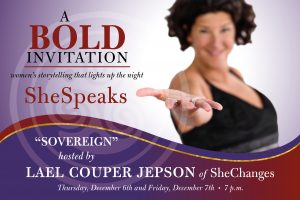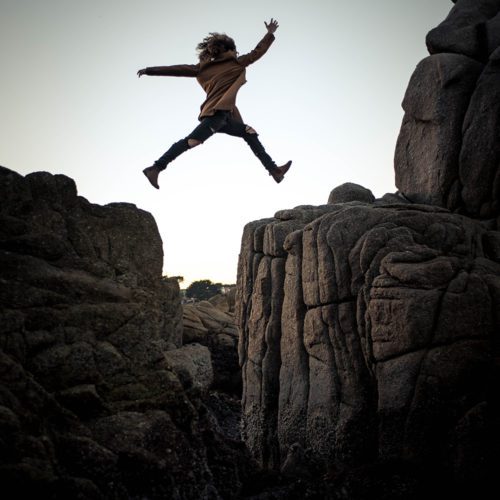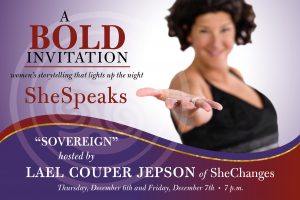 There I was, just minding my business on the northern line of London’s underground on vacation with my family and BOOM—I see it. Validation of everything I had been working toward all these years.
There I was, just minding my business on the northern line of London’s underground on vacation with my family and BOOM—I see it. Validation of everything I had been working toward all these years.
As we pull up to the Euston platform, the doors open, revealing this massive, not-to-be-missed sign that simply read:
“When women tell their stories loudly and clearly, things change for the better.”
And then the doors shut and we were moving again. I swear if there had been white doves released or the sound of angels singing in the underground that day, it could not have seemed more like a sign. It literally WAS a sign. I turned to look at my husband next to me and said, “Did you SEE THAT!?” Not waiting for his response, I started frantically reaching into my pockets or my bag to dig out a pen. Before he knew what was happening, I had spun him around and was using the flat plane of his back to furiously scribble the quote on a page of my London Lonely Planet book.
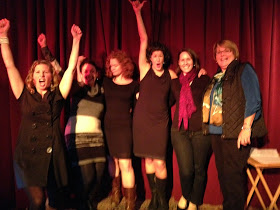
Truth be told, I don’t think I could forget that moment if I tried. Inside that quote was validation of what has been steering me—sometimes pushing, sometimes pulling—all these years to bring SheSpeaks, my evenings of women’s storytelling, back to the stage year after year. Inside that quote was the answer to “So what’s SheSpeaks about, anyway?” And inside that quote was the energy of the crowds that poured into SheSpeaks evenings every year, their hunger to hear more and more and more women’s stories pumping through our blood as loudly as the music that greets people as they arrive each evening.
Women’s stories and their power to change our world seem like they are everywhere I look these days…literally.
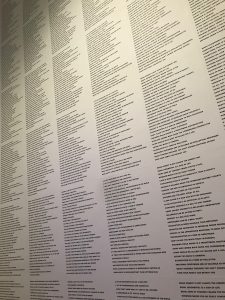
Earlier that day in London with my family, we had stumbled on an exhibit by Jenny Holzer in the Tate Modern museum where she had literally papered the walls of one entire room with all the messages she has heard and collected over the years. She called them “truisms,” even though as you begin to read through them, it becomes very obvious that they are riddled with contradictions. Her exhibit poses one provocative question to those to find themselves surrounded by these “trusims”:
“How do you cope—within and without—when all these views are present, sometimes clamoring, sometimes fighting, sometimes murderous?”
Put another way, she’s touching upon the very things that I ask of women who take the SheSpeaks stage with me each year:
What do you see?
How do you feel?
What are you making of it?
And where are you in all of that?
And then I hear #METOO. I thought I was the only one who thought (said, felt, experienced…) that, and it’s so good know I’m not alone. And it’s not just women saying these things after the events, but men as well.
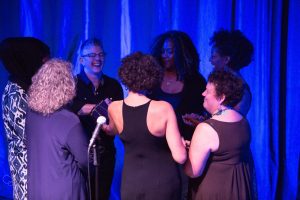 So many of us think we’re alone, don’t we? Maybe that’s the power of women’s stories—they connect us to ourselves and each other, and they have us rise individually and collectively as a result.
So many of us think we’re alone, don’t we? Maybe that’s the power of women’s stories—they connect us to ourselves and each other, and they have us rise individually and collectively as a result.
But women’s stories are everywhere, sometimes spoken, sometimes written, sometimes expressed as art, and sometimes seen on the walls of the underground. But what gives me hope is that they are taking center stage more and more.
When I came home from that London trip and I began to work with each of the ten speakers for this year’s SheSpeaks, I happened to stumble upon the Netflix special Nannette with Hannah Gadsby, and there it was once again… that validation…that sensation in my bones that telling our stories as women is some of the most important work of our times.
I can’t begin to do justice to the impact her show had on me because I’m still trying to find my words to describe how powerful it felt to me. So I’ll offer you some of Hannah’s words instead:
“Laughter is not our medicine. Stories hold our cure. Laughter is just our honey that sweetens our bitter medicine. I don’t want to unite you with laugher or anger. I just want my story heard and felt by individuals with minds of their own. Because like it or not, your story is my story and my story is your story.”
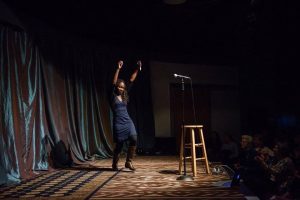 This is why I do SheSpeaks each year. Because I see stories as some of our most powerful medicine in these times. All stories have value, but too often we only hear a select few repeated in a loop, and after a while those stories start to morph into facts…and then systems and cultures. But like the best medicines, the best stories are the ones that are still alive—and being lived.
This is why I do SheSpeaks each year. Because I see stories as some of our most powerful medicine in these times. All stories have value, but too often we only hear a select few repeated in a loop, and after a while those stories start to morph into facts…and then systems and cultures. But like the best medicines, the best stories are the ones that are still alive—and being lived.
Women’s lived experiences. That’s what takes center stage at SheSpeaks each year. You can’t rehearse that shit. You can’t fake it or make it up. Sometimes it’ll make you cry, and sometimes it’ll make you roar with laughter, but the stories each night are told from the heart and caught by an amazing sold-out audience year after year.
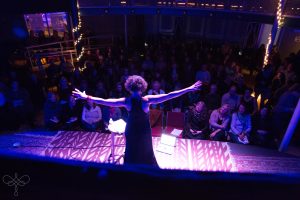 SheSpeaks is like my sign on the underground wall. Each year, a loaded car full of people comes barreling down the tracks headed for somewhere. They pull up to the platform, the doors open, and stories flood into the bones of the people on the train. And then, just like that, the doors shut, and we’re moving again.
SheSpeaks is like my sign on the underground wall. Each year, a loaded car full of people comes barreling down the tracks headed for somewhere. They pull up to the platform, the doors open, and stories flood into the bones of the people on the train. And then, just like that, the doors shut, and we’re moving again.
But you have to be there to see the sign. It’s not recorded, you won’t find them on YouTube, and you’ll only see still pictures of it that won’t nearly capture the magic. So now would be a great time to ask yourself: Do I want to be on that train December 6th or 7th (or both)?
If that answer is yes, you might want to pick up your ticket to ride at One Longfellow Square very soon—those cars on the underground are already getting full fas. And when it’s sold out, the doors of these two trains will close and they’ll head out of the station until it comes around again next year.
Thursday, Dec 6th will feature these storytellers:
Anne Morin
Louisa Irele
Corinne Mockler
Lyn Carter
Nadine Farag
Friday, December 7th will feature these storytellers:
Ashley Dobbs
Rosa Slack
Molly Neuner
Robin Hodgskin
Virginia Dearani

